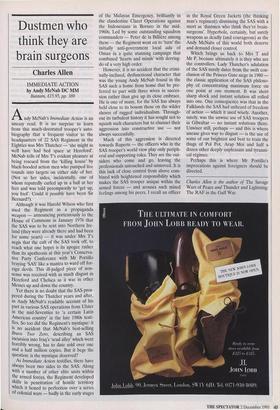Dustmen who think they are brain surgeons
Charles Allen
IMMEDIATE ACTION by Andy McNab DC MM Bantam, £15.95, pp. 389 Andy McNab's Immediate Action is an uneasy read. It is no surprise to learn from this much-decorated trooper's auto- biography that a frequent visitor to the headquarters of 22 SAS Regiment in the Eighties was Mrs Thatcher — 'she might as well have had bed space at Hereford'. McNab tells of Mrs T's evident pleasure at being rescued from the 'killing house' by black-hooded action men who pumped live rounds into targets on either side of her. (Not so her aides, incidentally, one of whom reputedly curled up in a ball at her feet and was told peremptorily to 'get up, you fool'. Could it possibly have been Sir Bernard?).
Although it was Harold Wilson who first used the Regiment as a propaganda weapon — announcing portentously to the House of Commons in January 1976 that the SAS was to be sent into Northern Ire- land (they were already there and had been for some years) — it was under Mrs T's aegis that the cult of the SAS took off, to reach what one hopes is its apogee rather than its apotheosis at this year's Conserva- tive Party Conference with Mr Portillo braying 'SAS' like a mantra to ward off for- eign devils. This ill-judged piece of non- sense was received with as much disgust in Hereford and Chelsea as it was in other Messes up and down the country.
Yet there is no doubt that the SAS pros- pered during the Thatcher years and after, as Andy McNab's readable account of his part in various SAS operations from Ulster in the mid-Seventies to 'a certain Latin American country' in the late 1980s testi- fies. So too did the Regiment's mystique: it is no accident that McNab's best-selling Bravo Two Zero, describing an SAS incursion into Iraq's 'scud alley' which went horribly wrong, has to date sold over one and a half million copies. But it begs the question: is the mystique deserved? As Immediate Action testifies, there have always been two sides to the SAS. Along with a number of other elite units within the armed forces, the Regiment developed skills in penetration of hostile territory which it honed to perfection over a series of colonial wars — badly in the early stages of the Malayan Emergency, brilliantly in the clandestine Claret Operations against the Indonesians in Borneo in the mid- 1960s. Led by some outstanding squadron commanders — Peter de la Billiere among them — the Regiment went on to 'turn' the initially anti-government local adu of Oman in a quite stunning campaign that combined 'hearts and minds' with derring- do of a very high order.
However, it is no accident that the crimi- nally-inclined, dysfunctional character that was the young Andy McNab found in the SAS such a home from home that he pre- ferred to part with three wives in succes- sion rather than give up its close embrace. He is one of many, for the SAS has always held close to its bosom those on the wilder shores of rugged individualism. Through- out its turbulent history it has sought not to squash such characters but to channel their aggression into constructive use — not always successfully. Much of this aggression is directed towards Ruperts — the officers who in the SAS trooper's world view play only periph- eral and supporting roles. They are the out- siders who come and go, leaving the professionals untouched and unmoved. It is this lack of close control from above com- bined with heightened responsibility which makes the SAS trooper unique within the armed forces — and arouses such mixed feelings among his peers. I recall an officer in the Royal Green Jackets (the thinking man's regiment) dismissing the SAS with a snort as 'dustmen who think they're brain- surgeons'. Hyperbole, certainly, but surely weapons as deadly (and courageous) as the Andy McNabs of this world both deserve and demand closer control.
Which brings us back to Mrs T and Mr P, because ultimately it is they who are the controllers. Lady Thatcher's adulation of the SAS surely dates from the swift con- clusion of the Princes Gate siege in 1980 the classic application of the SAS philoso- phy of concentrating maximum force on one point at one moment. It was short sharp shock and instant solution all rolled into one. One consequence was that in the Falklands the SAS had unheard of freedom of action — which it used wisely. Another, surely, was the unwise use of SAS troopers in Gibraltar — no instant solutions there. Unwiser still, perhaps — and this is where unease gives way to disgust — is the use of some of our brightest and best to train the thugs of Pol Pot, Arap Mai and half a dozen other deeply unpleasant and tyranni- cal regimes.
Perhaps this is where Mr Portillo's imprecations against foreigners should be directed.
Charles Allen is the author of The Savage Wars of Peace and Thunder and Lightning: The RAF in the Gulf War.










































































 Previous page
Previous page